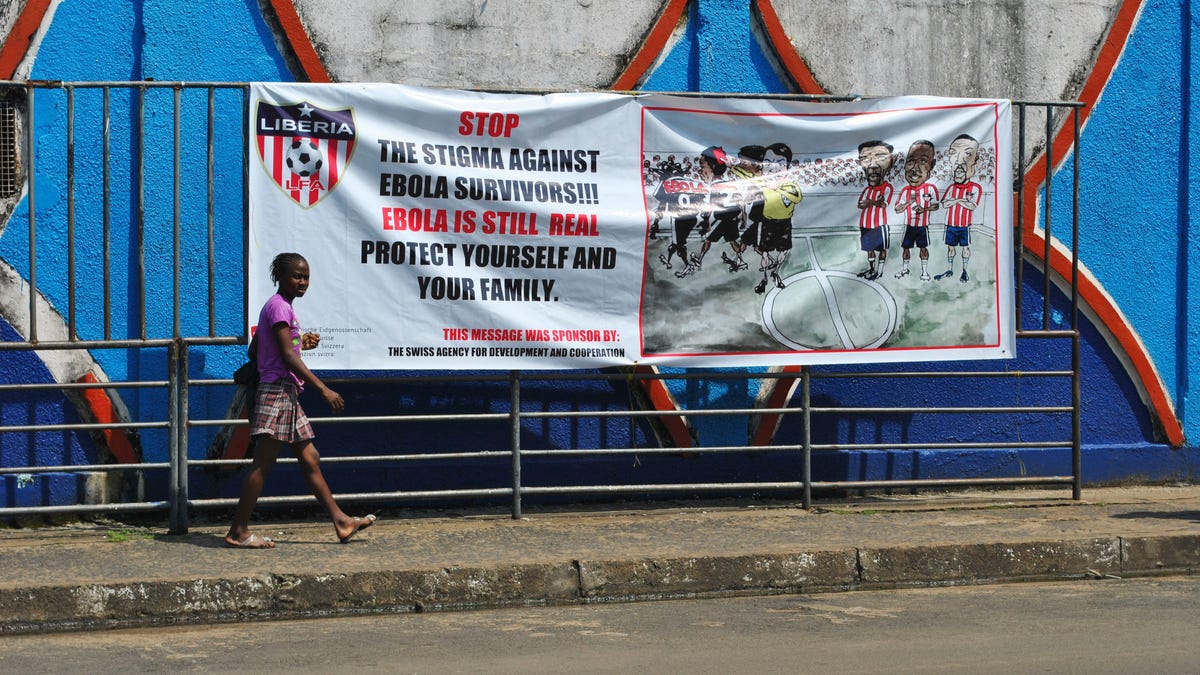
A woman walks pass an Ebola virus awareness campaign poster in Monrovia, December 8, 2014. REUTERS/James Giahyue
The World Health Organization (WHO) and the nations that fund it failed to respond quickly and effectively to the deadly West Africa Ebola outbreak despite repeated warnings by aid agencies, a UK parliamentary committee said on Thursday.
Ebola cases are rising dramatically in Sierra Leone, and the House of Commons International Development Committee said the international response was still "being outpaced on all fronts" by the spread of the Ebola virus in the former British colony.
The Ebola virus has killed more than 6,800 people and infected around 18,500 since March in West Africa, where poverty, corruption and civil war have left weak healthcare systems unable to cope with the spread of the disease.
The WHO's response has been characterized by unnecessary bureaucracy and a failure to "see some fairly plain writing on the wall," the report said.
The medical aid agency Medecins Sans Frontieres had warned that the epidemic had reached unprecedented proportions in June 2014, it added.
There was also no clear line of command between WHO headquarters in Geneva and country offices, the report said.
WHO spokesman Gregory Hartl did not comment on the specific accusations in the report and said member states would be given the opportunity to say how they would like the WHO to change in a special session with the WHO Executive Committee on Jan. 25.
The UK's Department for International Development (DFID) also came in for criticism from the parliamentary committee.
Despite renewed efforts to control the spread of the disease in the region, DFID was still doing too little to combat the epidemic and had not disbursed almost half of the pledged funds, the report said.
"As of 26 November, DFID had disbursed 117 million pounds of the 230 million pounds it has pledged, falling some way short of disbursement rates achieved by other donors," the report said.
Globally, a 50 percent cut in donor contributions to the WHO between 2011 and 2013 had also reduced the organization's ability to help poor nations respond to outbreaks and emergencies on the scale of the West Africa Ebola outbreak, the report said.
A DFID spokesman said in an email: "There are very few health systems in the world that could withstand a health crisis on this scale, but it is right to say we need to learn lessons from how the WHO and the international community responded."
Sierra Leone has overtaken Liberia as the country with the highest number of cases – over 8,000 - though more people have died from the hemorrhagic fever in Liberia, according to the latest government figures.
The Sierra Leonean government has launched ‘Operation Western Area Surge,’ a two-week operation to curb the spread of Ebola in the hard-hit area, including the capital Freetown.
Malcolm Bruce MP, Chair of the Committee, said strengthening the health system should be the centerpiece of DFID and the international community's reconstruction plans for Sierra Leone once the outbreak had been defeated.
"It is imperative that, once the immediate crisis is over, the eyes of the world do not turn away from the region," he said.
